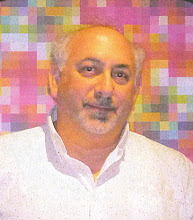 Theatre Out, which moved last year to the Empire Theatre in the Santa Ana Artists Village from Fullerton, has been producing an eclectic 8-play season there. Though musicals, camp and drag have found their way onto the lineup, Theatre Out has also committed itself to some ambitious dramatic work--like the Christopher Marlowe play it just opened last night, Edward II.
Theatre Out, which moved last year to the Empire Theatre in the Santa Ana Artists Village from Fullerton, has been producing an eclectic 8-play season there. Though musicals, camp and drag have found their way onto the lineup, Theatre Out has also committed itself to some ambitious dramatic work--like the Christopher Marlowe play it just opened last night, Edward II.Marlowe was a contemporary of Shakespeare, and some scholars consider him to be superior to the Bard as a dramatist and poet. Many believe that he was gay, based in part upon his treatment of the subject in his works, such as Edward II. (Shakespeare, too, has had such speculation about his sexuality based upon his Sonnets--but historians often characterize Elizabethan-era notions of love between men as distinct from our own contemporary concept of homosexuality.)
Edward II was one of England's least successful monarchs, ruling in the early 14th century. His favor for one of his knights, named Gaveston, contributed to rumors of his homosexuality, though he also married and fathered children.
In Darcy Hogan's verion of the Marlowe play (which she adapted & directed at Theatre Out), the King is so love-struck by Gaveston that me makes unwise decisions that anger the court, the Church and his pricipal rival, Mortimer. Hogan has shortened Edward II, but otherwise allows it to breathe as a period piece rather than contemporize it, and she has cast it mostly with actors capable of handling the Elizabethan verse in which it's written, and it dwells somewhere between the presentational demands of Renaissance theatre and a more naturalistic style which most contemporary actors (and audiences) consider to be a comfort zone.
Her cut of the play makes for a long first act (one hour and twenty minutes) and a short second act (30 minutes), and there was at least one earlier moment that seemed a more fitting point to break.
In this production, it appears that Theatre Out has attracted some committed and talented artists, and the whole experience--from ticketing online to lobby decor to welcoming staff and cleanliness of the facility--was professional and caring.
Like Edward II, Christopher Marlowe met an untimely, violent death speculated to be related to political intrigue (he was rumored to be a spy) or to a jilted lover. Nobody knows for sure, but there are some critics who believe that had his life not been cut short, Marlowe would have surpassed Shakespeare as the greatest of writers in the English language. Some have argued that Marlowe collaborated with Shakespeare on one or more plays while others believe that each of the writers borrowed heavily from each other.
Edward II really doesn't quite rank with Shakespeare's major tragedies, but it is certainly a compelling enough piece of theatre to devote an evening to. And since it's so rarely performed, Theatre Out is providing a valuable opportunity to experience it. It runs through June 5.





No comments:
Post a Comment